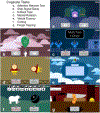Novel computerized neurocognitive test battery is sensitive to cancer-related cognitive deficits in survivors
- PMID: 35939254
- PMCID: PMC11274167
- DOI: 10.1007/s11764-022-01232-w
Novel computerized neurocognitive test battery is sensitive to cancer-related cognitive deficits in survivors
Abstract
Purpose: There is increasing interest in developing new methods to improve sensitivity in detecting subtle cognitive deficits associated with cancer and its treatments. The current study aimed to evaluate the ability of a novel computerized battery of cognitive neuroscience-based tests to discriminate between cognitive performance in breast cancer survivors and controls.
Methods: Breast cancer survivors (N = 174) and age-matched non-cancer controls (N = 183) completed the Enformia Cogsuite Battery of cognitive assessments, comprised of 7 computerized tests of multiple cognitive domains. Primary outcome measures included accuracy, reaction times (RT), and coefficients of variation (CV) for each task, as well as global scores of accuracy, RT, and CV aggregated across tests.
Results: Linear regressions adjusting for age, education, and remote vs. in-office administration showed that compared to non-cancer controls, survivors had significantly lower performance on measures of attention, executive function, working memory, verbal ability, visuospatial ability, and motor function. Survivors had significantly greater CV on measures of attention, working memory, and processing speed, and significantly slower RT on measures of verbal fluency.
Conclusions: The Cogsuite battery demonstrates sensitivity to cancer-related cognitive dysfunction across multiple domains, and is capable of identifying specific cognitive processes that may be affected in survivors.
Implications for cancer survivors: The sensitivity of these tasks to subtle cognitive deficits has advantages for initial diagnosis of cancer-related cognitive dysfunction, as well as detecting changes in survivors' cognitive function over time. The remote delivery of the battery may help overcome barriers associated with in-office administration and increase access to neurocognitive evaluation.
Keywords: Breast cancer; Cancer-related cognitive dysfunction; Cognitive impairment; Survivorship.
© 2022. The Author(s), under exclusive licence to Springer Science+Business Media, LLC, part of Springer Nature.
Conflict of interest statement
Figures
Similar articles
-
Remote, Computerised Cognitive Assessment for Breast Cancer- and Treatment-Related Cognitive Dysfunction: Psychometric Characteristics of the Cogsuite Neurocognitive Battery.Arch Clin Neuropsychol. 2023 Jul 25;38(5):699-713. doi: 10.1093/arclin/acac111. Arch Clin Neuropsychol. 2023. PMID: 36655820 Free PMC article.
-
Neurocognition in youth with versus without prediabetes.medRxiv [Preprint]. 2025 Jun 23:2025.06.23.25330130. doi: 10.1101/2025.06.23.25330130. medRxiv. 2025. PMID: 40666321 Free PMC article. Preprint.
-
Non-pharmacological interventions for cognitive impairment due to systemic cancer treatment.Cochrane Database Syst Rev. 2016 Aug 16;2016(8):CD011325. doi: 10.1002/14651858.CD011325.pub2. Cochrane Database Syst Rev. 2016. PMID: 27529826 Free PMC article.
-
Short-Term Memory Impairment.2024 Jun 8. In: StatPearls [Internet]. Treasure Island (FL): StatPearls Publishing; 2025 Jan–. 2024 Jun 8. In: StatPearls [Internet]. Treasure Island (FL): StatPearls Publishing; 2025 Jan–. PMID: 31424720 Free Books & Documents.
-
Interventions for preventing and ameliorating cognitive deficits in adults treated with cranial irradiation.Cochrane Database Syst Rev. 2022 Nov 25;11(11):CD011335. doi: 10.1002/14651858.CD011335.pub3. Cochrane Database Syst Rev. 2022. PMID: 36427235 Free PMC article.
Cited by
-
A phase II single-arm trial of memantine for prevention of cognitive decline during chemotherapy in patients with early breast cancer: Feasibility, tolerability, acceptability, and preliminary effects.Cancer Med. 2023 Apr;12(7):8172-8183. doi: 10.1002/cam4.5619. Epub 2023 Jan 16. Cancer Med. 2023. PMID: 36645168 Free PMC article. Clinical Trial.
-
Development and psychometric evaluation of item banks for memory and attention - supplements to the EORTC CAT Core instrument.Health Qual Life Outcomes. 2023 Nov 15;21(1):124. doi: 10.1186/s12955-023-02199-7. Health Qual Life Outcomes. 2023. PMID: 37968682 Free PMC article.
-
Cancer-Related Cognitive Impairment: A Practical Guide for Oncologists.JCO Oncol Pract. 2025 Mar 5:OP2400953. doi: 10.1200/OP-24-00953. Online ahead of print. JCO Oncol Pract. 2025. PMID: 40043223 No abstract available.
-
The effect of cancer and cancer treatment on attention control: evidence from anti-saccade performance.J Cancer Surviv. 2024 Nov 15. doi: 10.1007/s11764-024-01711-2. Online ahead of print. J Cancer Surviv. 2024. PMID: 39548022
-
Remote, Computerised Cognitive Assessment for Breast Cancer- and Treatment-Related Cognitive Dysfunction: Psychometric Characteristics of the Cogsuite Neurocognitive Battery.Arch Clin Neuropsychol. 2023 Jul 25;38(5):699-713. doi: 10.1093/arclin/acac111. Arch Clin Neuropsychol. 2023. PMID: 36655820 Free PMC article.
References
-
- Koppelmans V, Breteler MMB, Boogerd W, Seynaeve C, Gundy C, Schagen S. Neuropsychological performance in survivors of breast cancer more than 20 years after adjuvant chemotherapy. J Clin Oncol. 2012;30(10):1080–6. - PubMed
Publication types
MeSH terms
Grants and funding
LinkOut - more resources
Full Text Sources
Medical


